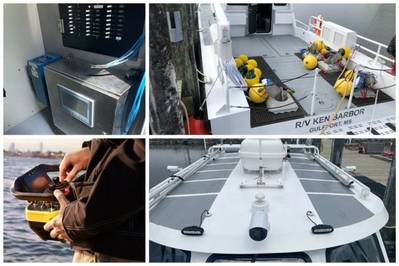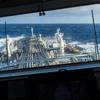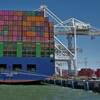Maritime Autonomy Operational Seminar Launched
A new seminar is the first maritime autonomy training program to allow the federal workforce to train on state-of-the-art, commercial, off-the-shelf autonomous technologies.
Sea Machines Robotics’ in partnership with The University of Southern Mississippi (USM) Roger F. Wicker Center for Ocean Enterprise in Gulfport, Miss. has developed the Maritime Autonomy Operational Seminar through USM's Center of Higher Learning at the John C. Stennis Space Center.
Participants plan missions that transform USM's R/V Ken Barbor, from a crewed to an uncrewed system designed to operate in various conditions, from shallow embayment with significant currents out to the open ocean. Learners will obtain an overview of maritime autonomy, how to use mission simulators, and deploy and operate uncrewed systems safely in coastal areas.
USM is a global leader in uncrewed maritime systems certifications. The five-week Uncrewed Maritime Systems Tier 1 and Tier 2 Certification Classes offered by USM’s School of Ocean Science and Engineering have been a fantastic success for NOAA, USACE, and NAVOCEANO employees at Stennis Space Center.
The addition of the Maritime Autonomy Operational Seminar builds on the tradition of success established by these academic credit classes as well as Ocean Enterprise's Stennis-based operational seminars (Maritime Cyber, Maritime Data Analysis, and Maritime Uncrewed Systems).
"By being very surgical and designing for enrollment in multiple sessions with adaptable content, we believe we can rapidly reach hundreds of potential learners, especially transitioning military personnel looking to enter the uncrewed systems field for the first time,” said Dr. Jason McKenna, Director of RDT&E and Training for the Roger F. Wicker Center for Ocean Enterprise at USM. “Furthermore, this new eight-hour self-paced/eight-hour in-person operational seminar Ocean Enterprise is offered through CHL and complements our three existing operational seminars by providing hands-on training for those interested in exploring maritime autonomous technology.
Added McKenna: “By getting some ‘stick time,’ on a state-of-the-art optionally crewed vessel, federal employees will be better prepared to integrate uncrewed autonomous capabilities into their fleet."
The Mississippi Gulf Coast is the home to significant operations of the National Oceanic and Atmospheric Administration (NOAA), the U.S. Navy, and the National Aeronautics and Space Administration (NASA). As a result, it provides numerous opportunities for collaboration between USM, Government, and industry.
"NOAA is highly supportive of USM's workforce development efforts, specifically focused on uncrewed maritime systems (UMS). We partner with USM's Roger F. Wicker Center for Ocean Enterprise on several projects, and we believe that offering these types of very hands-on, short-duration training to the federal community along the Gulf Coast will help meet the real, growing need for this workforce development in this area both regionally and nationally," said Philip Hoffman, Uncrewed Maritime Systems R&D Coordinator for NOAA Ocean Exploration.
Matthew Thompson, Technical Lead, Hydrographic Department, Naval Oceanographic Office, notes that opportunities provided by USM's Roger F. Wicker Center for Ocean Enterprise are enabling his team to field more efficient and effective operational capabilities in support of U.S. interests.
"As the Naval Oceanographic Office continues pursuit of Uncrewed Maritime Systems (UMS) for oceanographic and seafloor characterization, it is critical that we collaborate with academia, industry and other federal organizations to advance technology and expertise,” said Thompson.
Erik Hedval, Business Development Manager – Government, Sea Machines Robotics, points out that working with USM has been a logical and important next step for Sea Machines as the demand for operator training increases.
“The adoption of autonomous systems continues to grow in the government and commercial sectors, and it is important to us to help support the infrastructure surrounding it with the appropriate education and tools,” said Hedval.
Hedval continued, “Sea Machines various teams are comprised of several Mariners and Captains, so we understand the real-world applications and benefits in terms of productivity and safety and are excited to continue to expand this knowledge with USM.”














